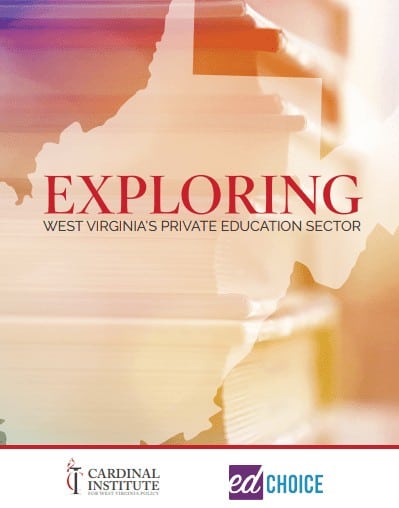ANDREW D. CATT
MICHAEL SHAW
February 2019
OVERVIEW
Exploring West Virginia’s Private Education Sector synthesizes information about West Virginia’s private schools from a survey conducted by EdChoice.
The Mountain State does not currently have any educational choice programs, but recent legislative pushes have brought options such as education savings accounts (ESAs) into the spotlight.
ESAs allow parents to withdraw their children from public district or charter schools and receive a deposit of public funds into government authorized savings accounts with restricted, but multiple, uses. Those funds—often distributed to families via debit card—can cover private school tuition and fees, online learning programs, private tutoring, community college costs, higher education expenses and other approved customized learning services and materials. Some ESAs, but not all, even allow students to use their funds to pay for a combination of public school courses and private services. Six states have ESA programs, although one of those state programs is currently inactive.
The characteristics of West Virginia’s private school sector can inform policy debates surrounding the potential creation of educational choice programs, such as ESAs. From September 19 to December 10, 2018, EdChoice administered a first-of-its-kind survey of West Virginia private school leaders. This brief provides a descriptive
analysis of the results of that survey, including tuition and fees, the number of open seats, regulatory concerns, and
interest in educational choice programs.
KEY FINDINGS
- Private schools in West Virginia have at least 1,786 open seats with a projected estimate closer to 6,300 open seats for K–12 students
- Nearly half of schools are already familiar with education savings accounts (ESAs)
- 74 percent would or probably would participate in a general ESA program
- Slightly more than one-third of schools are familiar with tax-credit scholarships
- 62 percent of schools would or probably would participate in a general tax-credit scholarship program
- Schools are mostly concerned with regulations regarding curriculum and instruction, school admissions and enrollment guidelines, teacher certification and licensure, and accommodations for students with special needs
- 70 percent of private schools serve students with special needs
- 73 percent of private schools provide some form of financial assistance to students
- 97 percent of private schools administer at least one nationally norm-referenced test to students


